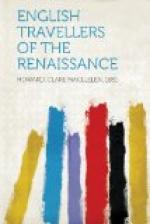But all these efforts to educate English boys on the lines of French ones came to nothing, because at the close of the seventeenth century Englishmen began to realize that it was not wise for a gentleman to confine himself to a military life. As to riding as a fine art, his practical mind felt that it was all very well to amuse oneself in Paris by learning to make a war-horse caracole, but there was no use in taking such things too seriously; that in war “a ruder way of riding was more in use, without observing the precise rules of riding the great horse."[263] He could not feel that artistic passion for form in horsemanship which breathes from the pages of Pluvinel’s book Le Maneige Royal[264] in which magnificent engravings show Louis XIII. making courbettes, voltes, and “caprioles” around the Louvre, while a circle of grandees gravely discuss the deportment of his charger. Even Sir Philip Sidney made gentle fun of the hippocentric universe of his Italian riding master:
“When the right vertuous Edward Wotton, and I, were at the Emperors Court together, wee gave ourselves to learne horsemanship of John Pietro Pugliano: one that with great commendation had the place of an esquire in his stable. And hee, according to the fertilnes of the Italian wit, did not onely afoord us the demonstration of his practise, but sought to enrich our mindes with the contemplations therein, which hee thought most precious. But with none I remember mine eares were at any time more loden, then when (ether angred with slowe paiment, or mooved with our learner-like admiration,) he exercised his speech in the prayse of his facultie. Hee sayd, Souldiers were the noblest estate of mankinde, and horsemen, the noblest of Souldiours. He sayde, they were the Maistres of warre, and ornaments of peace: speedy goers, and strong abiders, triumphers both in Camps and Courts. Nay, to so unbeleeved a poynt hee proceeded, as that no earthly thing bred such wonder to a Prince, as to be a good horseman. Skill of government, was but a Pedanteria in comparison: then woulde he adde certaine prayses, by telling what a peerlesse beast a horse was. The only serviceable Courtier without flattery, the beast of the most beutie, faithfulness, courage, and such more, that if I had not beene a peece of a Logician before I came to him, I think he would have perswaded mee to have wished my selfe a Horse."[265]
That this was somewhat the spirit of the French academies there seems no doubt. Though they claimed to give an equal amount of physical and mental exercise, they tended to the muscular side of the programme. Pluvinel, says Tallemant des Reaux, “was hardly more intelligent than his horses,"[266] and the academies are supposed to have declined after his death.[267] “All that is to be learned in these Academies,” says Clarendon, “is Riding, Dancing, and Fencing, besides some Wickednesses they do not profess to teach. It is true they have men there who teach Arithmetick,




